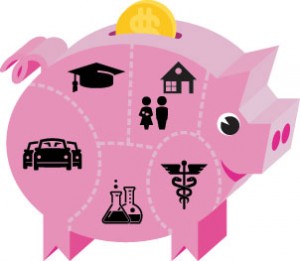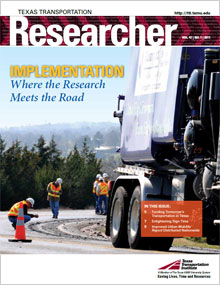Or, Why Transportation Research Is More Important Than Ever

It’s hard to tighten your belt when you run out of holes in the leather. But when you can’t afford a new belt, you just have to work with what you’ve got.
In a nutshell, that’s what the Texas Legislature is facing in the current budget cycle. According to some estimates, Texas faces a budget shortfall in the neighborhood of $20 billion. Legislators will have to make some tough decisions as a result.
In this environment, the benefits derived from effective, implementable research can be considerable. Through research, the Texas Transportation Institute (TTI) seeks “a better way.” I’ve said that before in this column, but it’s worth repeating in these days of stretching state dollars to meet public needs. Better is defined to mean a smarter, safer and more efficient transportation system. In legislative terms, improved traffic safety means lives saved, less injuries and an overall reduced impact from crashes on our health care system. Businesses and commuters alike see benefits from a smarter transportation system through reduced fuel consumption and air pollution and cheaper goods that reach store shelves more efficiently. All of that equates to reduced overall costs and a higher quality of life for Texans.
Beyond the benefits realized from investing in quality research, in recent years the Texas Legislature has relied on TTI more directly via testimony about the state of our transportation system and its needs. From our work with the 2030 Committee, which provides data about the transportation challenges faced by Texas in the next two decades, and studying funding alternatives, such as vehicle mileage fees, the Institute’s expertise is giving legislators the background they need to craft good policy for the citizens of Texas.
 With its summary of recent TTI testimony before the Texas Legislature, the center spread of this issue of Researcher paints a broader portrait of how much legislators rely on what we know about transportation at TTI. And beyond the borders of Texas, we’re helping sponsors, from Washington State to Florida, find that better way. TTI‘s 2010 Urban Mobility Report — currently the nation’s standard for understanding the impact of congestion on bottom lines around the country — was released this quarter. The coming year will see a new national standard for sign retroreflectivity, and the nation’s roads will be a little bit safer thanks to work by TTI staff.
With its summary of recent TTI testimony before the Texas Legislature, the center spread of this issue of Researcher paints a broader portrait of how much legislators rely on what we know about transportation at TTI. And beyond the borders of Texas, we’re helping sponsors, from Washington State to Florida, find that better way. TTI‘s 2010 Urban Mobility Report — currently the nation’s standard for understanding the impact of congestion on bottom lines around the country — was released this quarter. The coming year will see a new national standard for sign retroreflectivity, and the nation’s roads will be a little bit safer thanks to work by TTI staff.
Our problems might seem local, but we see it on the news every day — the nation is tightening its collective belt. And Texas, while better off than some states, is no different. TTI research positively impacts our state’s economic competitiveness and our citizens’ quality of life.
We’re honored that the Texas Legislature places so much faith in what we do. Making good policy, building better roadways, streamlining systems without sacrificing safety — that’s the better way that makes TTI research necessary, especially when times are toughest.
